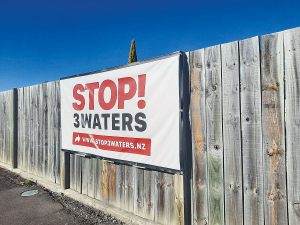Nasty surprise
The late expansion of Three Waters to Five by Minister Nanaia Mahuta seems to have caught her own Cabinet colleagues out, with even the Prime Minister's office taking a while to get its spin straight on this one.
 Both Manawatū District Council and Taupō District Council have spoken up in opposition to the Three Waters reforms at select committee this week.
Both Manawatū District Council and Taupō District Council have spoken up in opposition to the Three Waters reforms at select committee this week.
Two district councils have spoken to the Finance and Expenditure Select Committee this week, expressing opposition and concerns regarding the controversial Three Waters Reform.
If passed, the Water Services Entities Bill would see the set up of new entities and transfer council management of water services to four water services entities. In return, councils would be made the sole shareholders in the entities, possessing one share per 50,000 people in their area.
A delegation from Manawatū District Council (MDC), led by Deputy Mayor Michael Ford, presented their opposition on Monday.
They expressed concerns around property rights and fair compensation for the investment made by residents, claiming there was a possibility that the transfer of Three Waters services into the proposed entities would stifle economic development.
“When approached by a development that involves an extension to three waters networks, MDC is able to negotiate directly with the developer to reach a mutually acceptable solution… The transfer of decision-making from local government to Entity C will remove MDC’s ability to work directly with customers to develop customised solutions,” Ford told the committee.
The delegation also questioned the proposed entities ability to cater for land use planning without local knowledge at a decision-making level and highlighted that decision-making around three waters assets needs to be made in conjunction with roading, district planning and economic development.
Speaking as the chair of Communities 4 Local Democracy (C4LD), Manawatū District Mayor Helen Worboys said the organisation had commissioned its own modelling which demonstrated the transition costs of setting up the new entities were wasteful.
“Castalia’s modelling for us shows that capital expenditure in the sector is actually financeable for the next 20 years, and beyond that with only the most modest of price increases. Accordingly, the four mega entity, “balance sheet separation” is simply not necessary. Other structural alternatives do exist and would effectively address the core problem,” she said.
Taupō District Council also spoke to Select Committee, with Mayor David Trewavas and councillor Kevin Taylor stating that the Council didn’t agree with the Government’s approach to the reforms.
“There is a need for our communities to have a greater voice on the management of three waters infrastructure, and our associated ability to shape the growth and wellbeing within our district,” Trewavas and Taylor said.
The select committee report on the Waters Services Entities Bill is due on 11 November and may include recommended amendments on the bill based on the submissions received. Government expects to push it through second and third readings to Royal Assent by the end of this year.
Rural retailer Farmlands has released it's latest round of half-year results, labeling it as evidence that its five-year strategy is delivering on financial performance and better value for members.
OPINION: "We are back to where we were a year ago," according to a leading banking analyst in the UK, referring to US president Donald Trump's latest imposition of a global 10% tariff on all exports into the US.
DairyNZ says the Government’s proposed Resource Management Act reform needs further work to ensure it delivers on its intent.
Overseas Trade Minister Todd McClay says he's working constructively with the Labour Party in the hope they will endorse the free trade agreement (FTA) with India when the agreement comes before Parliament for ratification.
Donald Trump's latest tariff tantrum has again thrown the world of trade into a new round of turmoil and uncertainty, and NZ is caught up in it.
The third edition of the NZ Dairy Expo, held in mid-February in Matamata, has shown that the KISS principle (keep it simple stupid) was getting a positive response from exhibitors and visitors alike.

OPINION: A mate of yours truly reckons rural Manawatu families are the latest to suffer under what he calls the…
OPINION: If old Winston Peters thinks building trade relations with new nations, such as India, isn't a necessary investment in…